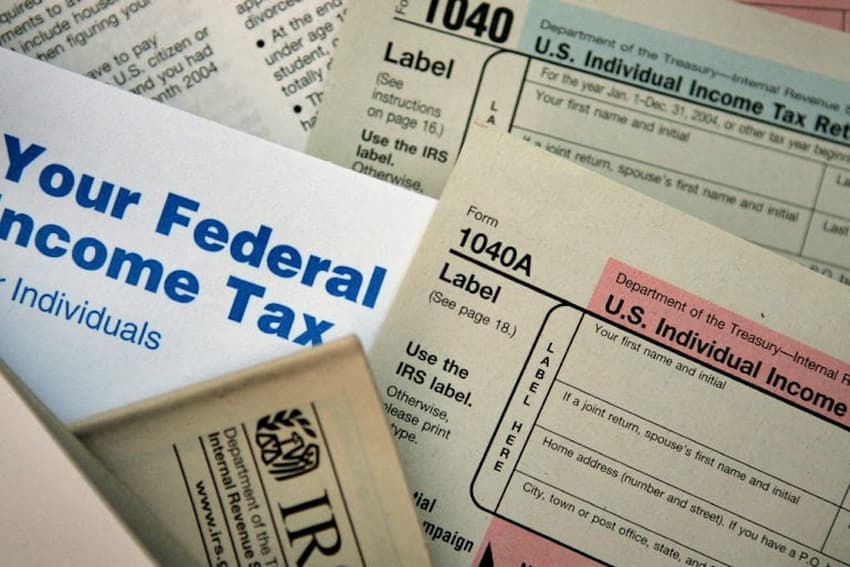EXPLAINED: The tax mistakes Americans in Germany should avoid

Spring means the start of tax season for Americans. And the looming US tax deadline can be the source of several headaches for the thousands living in Germany.
That’s because the U.S. is one of three countries that utilise citizenship-based taxation. American citizens are taxed on their worldwide income, regardless of what country they call home.
The Local spoke with Kasia Strzelczyk, tax specialist at 1040 Abroad, an international tax firm headed up by a U.S. expat, to discuss some of the common mistakes American expats make during tax season.
READ ALSO: 'It led to divorce': How US tax rules burden Americans in Germany
Failing to file US taxes
Moving to Germany does not exempt you from US tax obligations. Americans and US Green Card holders must file US taxes yearly regardless of residency because of America's citizenship-based taxation law. Americans are required to file US taxes until death or they renounce citizenship.
“Many American expats mistakenly believe they don’t need to file U.S. taxes if their income is below the Foreign Earned Income Exclusion (FEIE) threshold,” Strzelczyk said.
While Americans abroad receive an automatic filing extension until June 15th, any taxes owed still need to be paid by the April 15th deadline, according to the IRS.
U.S. citizens and Green Card holders can exclude up to $120,000 of foreign-earned income in 2023. For married couples who both work abroad and file together, up to $240,000 can be excluded for the 2023 tax year. The FEIE threshold changes every year to keep up with inflation.
READ ALSO: 'So many hurdles': How Americans in Germany are struggling to renounce US citizenship
Still, Strzelczyk said claiming the FEIE doesn't automatically exclude all forms of income and can affect eligibility for certain deductions and credits. Reach out to a tax specialist to determine what would be best for your tax situation.
Forgetting to file taxes in the US can result in hefty fines, but the IRS offers the streamlined foreign offshore procedure to help expats who haven’t filed in previous years catch up on their taxes. The IRS tax amnesty program pardons expats if their non-compliance is non-willful. If you do not owe any taxes to the U.S. you will not be subject to the failure to file or failure to pay penalties.

We get it, taxes can be a pain, especially for Americans abroad. Photo by Elisa Ventur on Unsplash
Not filing German taxes first
Once you’ve determined that you will pay taxes in Germany and the U.S. it’s also important to determine the most advantageous timing for filing.
Strzelczyk said the order of filing taxes can be important for Americans living abroad.
“When American expats are living in Germany, they should start by filing their German taxes,” she said. “This way, they can make sure to claim any deductions they're eligible for. After finishing up with the German tax authorities, they can move on to their US taxes.”
US expats are required to declare their worldwide income on their US tax returns regardless of their country of residence. By completing German taxes first, Americans can lower their US tax bill with the Foreign Tax Credit which accounts for the taxes they already paid in Germany.
Misunderstanding US-Germany Tax Treaty
The US-Germany tax treaty enacted in 1954 helps American expats and Germans living in the US avoid double taxation.
It does not allow expats to skip filing taxes in either country. Instead, the treaty outlines how different types of income are taxed and by whom. To benefit from the treaty, expats must fill out the proper forms.
This is a specialist area of tax law, so it is important to find a qualified tax adviser or accountant to ensure German and US tax laws are met.
Not utilizing advantageous tax credits
Many expats are unaware of US tax credits they may be eligible for that can provide tax relief. A few examples of credits you may be eligible for include: Child Tax credit, Foreign Housing Exclusion and Child and Dependent Care Credit.
Some American families can also benefit from tax credits even if they don’t pay US income taxes. The child tax credit is refundable, so families can get money back even if they have no taxes owed.
To be eligible for this tax credit, children born to at least one American parent abroad will need a Social Security Number (SSN). Parents will need to apply for a SSN at through the US Consulate in Frankfurt, a process which can take upwards of several months.
And deductions are not limited to the US case. American expats can also utilize a standard lump sum deduction of €1,230 per year for work-related expenses to reduce their German tax burden. In some cases, the costs associated with maintaining two households for work reasons can also be tax deductible. Taxpayers with children can also use the childcare and children allowance and the child benefit.
Not seeking help early
No two tax situations are the same. For Americans living and planning to retire abroad, it may be advantageous to meet regularly with a tax specialist or accountant to ensure you are in line with complex US and German tax laws.
Comments (1)
See Also
That’s because the U.S. is one of three countries that utilise citizenship-based taxation. American citizens are taxed on their worldwide income, regardless of what country they call home.
The Local spoke with Kasia Strzelczyk, tax specialist at 1040 Abroad, an international tax firm headed up by a U.S. expat, to discuss some of the common mistakes American expats make during tax season.
READ ALSO: 'It led to divorce': How US tax rules burden Americans in Germany
Failing to file US taxes
Moving to Germany does not exempt you from US tax obligations. Americans and US Green Card holders must file US taxes yearly regardless of residency because of America's citizenship-based taxation law. Americans are required to file US taxes until death or they renounce citizenship.
“Many American expats mistakenly believe they don’t need to file U.S. taxes if their income is below the Foreign Earned Income Exclusion (FEIE) threshold,” Strzelczyk said.
While Americans abroad receive an automatic filing extension until June 15th, any taxes owed still need to be paid by the April 15th deadline, according to the IRS.
U.S. citizens and Green Card holders can exclude up to $120,000 of foreign-earned income in 2023. For married couples who both work abroad and file together, up to $240,000 can be excluded for the 2023 tax year. The FEIE threshold changes every year to keep up with inflation.
READ ALSO: 'So many hurdles': How Americans in Germany are struggling to renounce US citizenship
Still, Strzelczyk said claiming the FEIE doesn't automatically exclude all forms of income and can affect eligibility for certain deductions and credits. Reach out to a tax specialist to determine what would be best for your tax situation.
Forgetting to file taxes in the US can result in hefty fines, but the IRS offers the streamlined foreign offshore procedure to help expats who haven’t filed in previous years catch up on their taxes. The IRS tax amnesty program pardons expats if their non-compliance is non-willful. If you do not owe any taxes to the U.S. you will not be subject to the failure to file or failure to pay penalties.

Not filing German taxes first
Once you’ve determined that you will pay taxes in Germany and the U.S. it’s also important to determine the most advantageous timing for filing.
Strzelczyk said the order of filing taxes can be important for Americans living abroad.
“When American expats are living in Germany, they should start by filing their German taxes,” she said. “This way, they can make sure to claim any deductions they're eligible for. After finishing up with the German tax authorities, they can move on to their US taxes.”
US expats are required to declare their worldwide income on their US tax returns regardless of their country of residence. By completing German taxes first, Americans can lower their US tax bill with the Foreign Tax Credit which accounts for the taxes they already paid in Germany.
Misunderstanding US-Germany Tax Treaty
The US-Germany tax treaty enacted in 1954 helps American expats and Germans living in the US avoid double taxation.
It does not allow expats to skip filing taxes in either country. Instead, the treaty outlines how different types of income are taxed and by whom. To benefit from the treaty, expats must fill out the proper forms.
This is a specialist area of tax law, so it is important to find a qualified tax adviser or accountant to ensure German and US tax laws are met.
Not utilizing advantageous tax credits
Many expats are unaware of US tax credits they may be eligible for that can provide tax relief. A few examples of credits you may be eligible for include: Child Tax credit, Foreign Housing Exclusion and Child and Dependent Care Credit.
Some American families can also benefit from tax credits even if they don’t pay US income taxes. The child tax credit is refundable, so families can get money back even if they have no taxes owed.
To be eligible for this tax credit, children born to at least one American parent abroad will need a Social Security Number (SSN). Parents will need to apply for a SSN at through the US Consulate in Frankfurt, a process which can take upwards of several months.
And deductions are not limited to the US case. American expats can also utilize a standard lump sum deduction of €1,230 per year for work-related expenses to reduce their German tax burden. In some cases, the costs associated with maintaining two households for work reasons can also be tax deductible. Taxpayers with children can also use the childcare and children allowance and the child benefit.
Not seeking help early
No two tax situations are the same. For Americans living and planning to retire abroad, it may be advantageous to meet regularly with a tax specialist or accountant to ensure you are in line with complex US and German tax laws.
Join the conversation in our comments section below. Share your own views and experience and if you have a question or suggestion for our journalists then email us at [email protected].
Please keep comments civil, constructive and on topic – and make sure to read our terms of use before getting involved.
Please log in here to leave a comment.